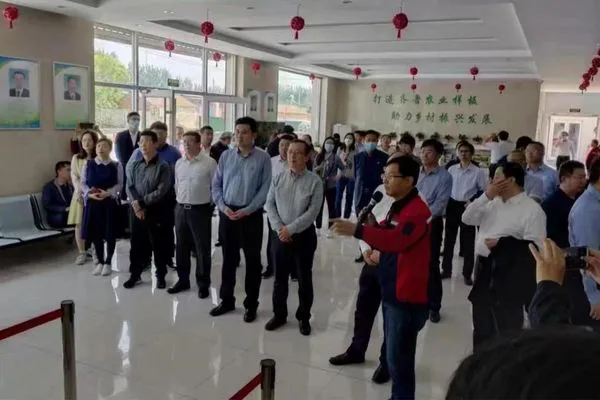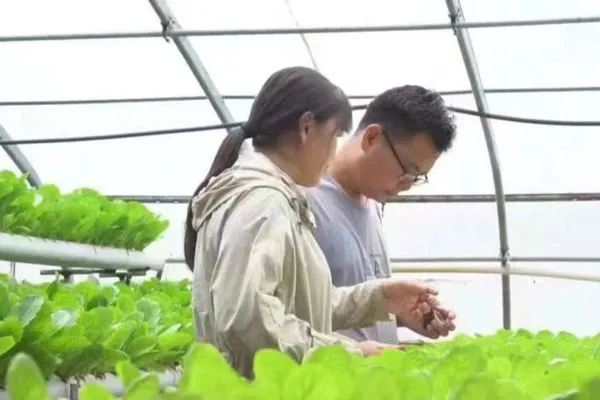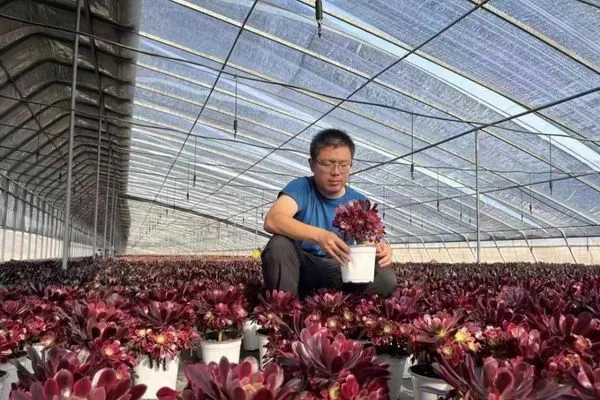In recent years, Wucheng County in Dezhou, Shandong Province, has continuously introduced and cultivated new professional growers and developed enterprises to help and benefit growers. This is part of the County's rural revitalization strategy, attracting young talent to the region to open up new businesses.
The County has implemented a program that gives this a 'new generation' of growers the opportunity to use their technical knowledge and skills in the development of the regional horticulture industry and to drive their local economy.

Hydroponic Chinese cabbage drives employment
"This kind of hydroponic Chinese cabbage ripens in 20 days. We can harvest 15 crops a year," says Li XiaShuang, head grower of a base near WuCheng County, cheerfully. On March 5, in the ShengMao production base in the old town of WuCheng County, the Chinese cabbage was growing steadily in its multi-layer hydroponic vertical farm. Growers were moving through the frames to harvest the cabbage.

In recent years, hydroponic vegetables have quietly 'climbed' their way onto the dining table of WuCheng citizens. This novel planting method has also made Li well-known. After graduating from university, Li went to Shanghai to start a business. After several years of hard work and continuous learning, the Shengmao Agricultural Hydroponics Vegetable Company was founded in 2019.
Unlike traditional vegetable production, hydroponic vegetable growing uses a vertical hydroponic planting structure and intelligent circulation system to continuously supply nutrients to the plants.
The whole growth process does not use chemical fertilizers and pesticides, which is not only ecological and environmentally friendly, but also saves costs.
"Through this novel vertical planting model, the gap in the leafy vegetable market is diminishing," says Li. Nowadays, the hydroponic vegetable greenhouses run by Li and his wife have been expanded from the previous 4 to now 26 growing facilities. Its annual output has grown to one million, and the business is driving employment in several surrounding villages.
Succulent cultivation increases income
In the greenhouse of Lvzhuang Village, Wucheng County, various succulents are growing vigorously. Lv Jianchao, general manager of Yiqi Horticulture Co., Ltd., is busy planting and transplanting the plants.
Lv is a native of Lvzhuang Village. After graduating from Shandong Agricultural University, majoring in biotechnology, he chose to go back to his hometown to start a business.
Since 2013, he has seen the broad market prospects of succulents and started the construction of a greenhouses in his own fields for planting.
With professional skills and hard work, Lv has quickly accumulated the growing experience and propagation technology of succulents, and the base has also achieved snowball-like steady development. At present, the company has built 13 succulent greenhouses, becoming the largest succulent breeding base in northwest Shandong, with annual sales exceeding 500,000. For this reason, Lv was awarded the "Good Youth in Rural Areas of Shandong Province" and "Demonstration Leader of New Rural Youth in Dezhou City" awards.

Behind this 'new generation grower' who returned to Wu to start a business is the welcoming entrepreneurial environment that is inseparable from Wucheng County.
To realize the overall revitalization of rural areas, the first and most stringent task is to revitalize rural talents, and bring them back to the region.
Wucheng County has created an excellent cultivation base for enterprises returning to Shandong according to local conditions. This is helping to create a better entrepreneurial environment for them by introducing talent support policies, issuing support funds, and launching agri-financial products. This way, young entrepreneurs feel that they can take steps and explore forward in new directions and new goals, providing 'new energy' for promoting rural revitalization.
"Both Li, who develops hydroponic vegetables, and Lv, who is growing his floral business, are ' new-generation growers' returning to their hometowns to start new businesses. This is not not only bringing advanced development concepts and modern information to Wucheng, but also achieving the goal of increasing incomes and creating a new economic development model", says Wei Kaizhang, the deputy magistrate of Wucheng County.
According to statistics, in recent years, more than 190 young people with technical secondary school education or above have returned to their hometowns to start businesses involving planting grain, fruits and vegetables, farming, and the socialized service of agricultural machinery, which has become a brand-new force to promote rural revitalization and agricultural and rural modernization.










